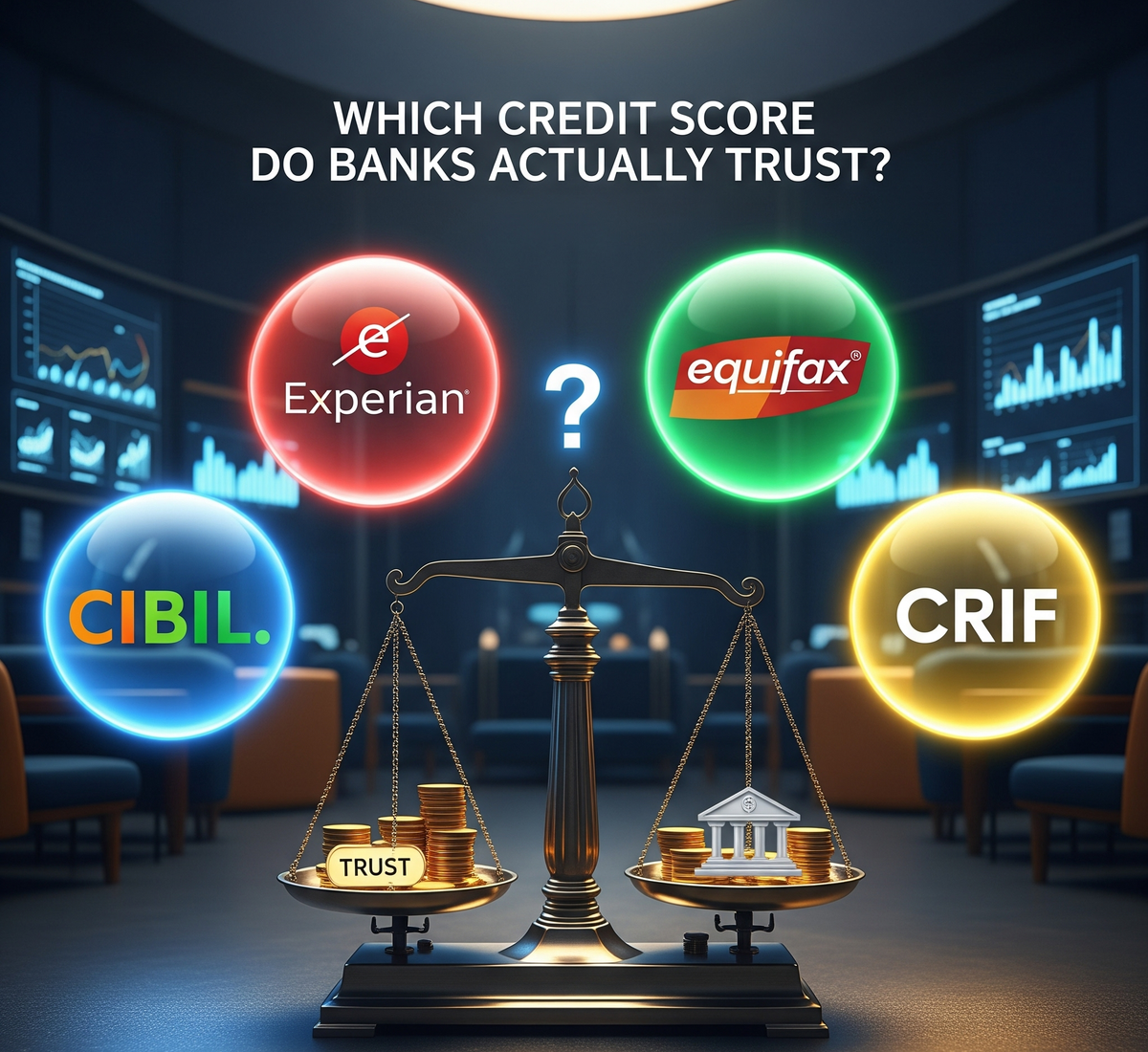CIBIL vs Experian vs Equifax vs CRIF: Which Credit Score Do Banks Actually Trust?

When people in India think of credit score, most of them instantly think of CIBIL. But here’s the truth: CIBIL is just one of the four official credit bureaus in India. Along with it, Experian, Equifax, and CRIF Highmark also maintain your credit records and calculate your credit score. So naturally, the question arises—if there are four different scores, which one do banks and NBFCs actually trust when you apply for a loan or credit card?
Let’s dive deeper into this, because the answer isn’t as simple as you might think.
Understanding the Four Credit Bureaus in India
CIBIL (Credit Information Bureau India Limited)
- The oldest and most widely recognized credit bureau in India.
- Established in 2000, it holds data for over 600 million individuals and companies.
- Its score (300-900) is often the “default” score lenders check, especially for first-level credit eligibility.
Experian
- A global credit bureau with a strong presence in India.
- Known for offering detailed reports and insights beyond just the score, such as probability of default and credit behavior trends.
- Banks use Experian scores particularly for personal loans and credit card approvals.
Equifax
- Entered the Indian market in 2010.
- Offers detailed sector-wise insights—like SME lending, microfinance, and rural credit.
- Popular among lenders that want deeper risk analysis for business loans and niche lending categories.
CRIF Highmark
- Relatively new but rapidly growing.
- Strong focus on microfinance, rural lending, and NBFC partnerships.
- Frequently used by lenders who serve Tier 2 and Tier 3 cities.
Why Do Scores Differ Between Bureaus?
Many borrowers get confused when they see different scores from each bureau. Here’s why this happens:
- Reporting differences: Not every bank or NBFC reports to all four bureaus. For example, one lender might share data only with CIBIL and Experian, but not with CRIF.
- Update timelines: Some bureaus update faster than others. A recent payment might show up in Experian before it appears in CIBIL.
- Scoring algorithms: Each bureau uses its own proprietary algorithm to calculate risk, even if the inputs are the same.
So, your score might be 750 in CIBIL, 730 in Experian, 710 in Equifax, and 760 in CRIF—all valid, but slightly different.
Which Score Do Banks Actually Use?
Here’s the inside story:
- Most banks prefer CIBIL as the first check. Because it’s the oldest and most widely recognized, CIBIL often acts as the default reference point.
- Large banks and NBFCs usually pull scores from at least 2 bureaus. For example, HDFC Bank may check both CIBIL and Experian before approving a credit card.
- Some specialized lenders use bureau-specific scores. For instance, microfinance institutions may rely more on CRIF, while SME-focused lenders may use Equifax.
- The RBI mandates that all four bureaus should be equally valid. Which means legally, no bank can say “we only trust CIBIL.” But in practice, preference varies.
What This Means for You
- Don’t panic if your CIBIL score differs from Experian or Equifax. Small differences are normal.
- Focus on maintaining good habits across the board. Pay EMIs on time, keep credit utilization low, and avoid multiple loan applications. These reflect positively in all bureaus.
- Check all four reports once a year. Sometimes, one report might show an error (like a closed loan still marked open). Catching it early can save you from rejection.
- Banks look at your overall profile, not just one score. Income, job stability, and existing obligations also play a big role.
The Bottom Line
So, which score do banks actually trust—CIBIL, Experian, Equifax, or CRIF? The truth is, all of them. But if you had to pick one as the most influential in India, it’s still CIBIL, followed closely by Experian.
That said, lenders don’t just look at one number in isolation. They analyze your entire financial behavior, and increasingly, they’re using multiple bureaus together to reduce risk.
For you as a borrower, the strategy is simple: maintain good credit hygiene across the board. If you do that, whichever bureau a bank pulls your score from, you’ll come across as a trustworthy borrower.